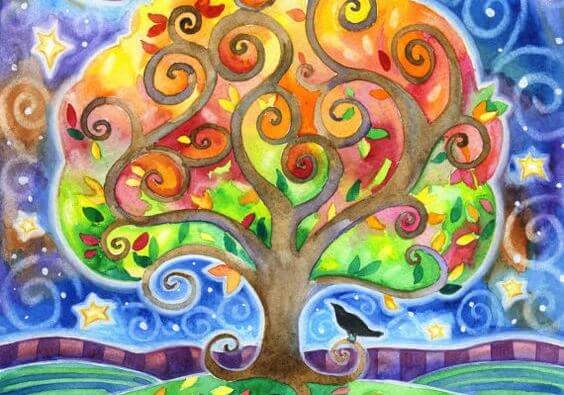In the Dark, "Enlightened" People Guide Us

In times of darkness there are always “enlightened”people to guide us. They are like the sunlight hitting a shop window. They inspire us and give us hope when we lose direction, our temper and the north of our life compasses. Enlightened people are medicine to the heart in times of adversity.
We can love our independence, our proud self-sufficiency. However, when there is a tempest outside, sooner or later, sadness starts leaking in. Fear, insomnia and uncertainty, mitigated only by emotional support, empathy and affection afloat.
“Sometimes our light goes out but is blown into flame by another human being”
– Albert Schweitzer-
Well, here is some interesting information. Social psychology reveals that emotional support is an art not everyone knows how to offer in a proper way. Much to our surprise, occasionally, people who love us the most give us disproportionate attention, which generates a sense of psychological dependency, of inefficacy or weakness.
The most effective support is ever-present, subtle, encircling and authentic. There are no “donors” and “recipients” of affection. It is a flowing, subtle and marvelous reciprocity.

People who erode and “enlightened” people
We all know what empathy is and its impact in our everyday relations. When dealing with someone unable to connect with others, with certain aggressive, hostile and even destructive nuances, we often say “this person has no empathy.”
Simon Baron-Cohen, a professor at Cambridge University and an expert in psychopathology, defines these psychological traits as: “erosive empathy.” According to him, this behavior arises when an individual, not only stops “connecting” with the neighbor, but also erodes, undermines and fragments, with persistent slowness, those who are closest to him/her.
On the opposite side, are ‘enlightened’ people. More than seeing them as personalities of great nobility and goodness, we can define them as men and women who “know how to be and let be”. Facilitators of internal harmony, emotional spinners who gather our broken pieces to remind us, once again, how beautiful and important we can be.

Psychological characteristics of “enlightened” people
At the beginning we explained that giving support is actually an art that not everyone knows how to practice. For example, something worth remembering is that at the time the donor clearly distinguishes him/herself from the recipient, there may be occasional discomforts. The recipient may feel like a “debtor” or become dependent on a donor who enjoys his or her caregiver role.
“Enlightened” people , meanwhile, do not assume a role as caretaker. They are facilitators. They understand how to be without controlling. Not judging and exercising at any moment a constant attention so that the other person does not develop attachment.
They are experts at generating real personal growth. They respect others’ space and know how to protect the privacy of the other when needed. They are always subtle. They have an exceptional ability to remind us who we are. They worry, they bring positivity, encouragement and hope.
How to learn to give light? How to offer authentic emotional support?
“Enlightened” people guide us in times of trouble. They accompany us in good times and inspire us in our day to day. That’s something we all know. Now, would we be able to offer the support with the same quality and authenticity?
“If you light a lamp for someone else, it will also brighten your own path.”
-Buddha-
Believe it or not, offering emotional support is not easy. One needs very deep, self-knowledge of our own emotions and of a decentralization of that “I”.

Keys to developing real support
Some people manage to empathize with the others but never develop a cognitive empathy. It is not only a matter of “feeling” what the person before me is experiencing. I must also understand him/her.
At the same time, emphatic precision must be developed. We talk about that ability to correctly infer the mental state of the other person. To do this, you must know how to ask the right questions. Not to judge out loud. Listen carefully. Avoid increasing the other person’s anxiety using classic expressions such as “that’s nothing” “it could be worse.”
At the same time, we must bear in mind that for those who are having a really bad time the typical good phrases of “I am here if you need me” or “you can count on me” aren’t especially helpful. More than words you need real, tangible and visible facts that demonstrate it.
“Enlightened” people are of few words, but of great acts. They will be by your side before you ask. They will read in your eyes your tribulations, your sadness. In conclusion, what we sometimes understand by support is not really so. Good support is based on saying the right thing, but also on doing what is appropriate, through small acts of kindness and sincere interest.
In times of darkness there are always “enlightened”people to guide us. They are like the sunlight hitting a shop window. They inspire us and give us hope when we lose direction, our temper and the north of our life compasses. Enlightened people are medicine to the heart in times of adversity.
We can love our independence, our proud self-sufficiency. However, when there is a tempest outside, sooner or later, sadness starts leaking in. Fear, insomnia and uncertainty, mitigated only by emotional support, empathy and affection afloat.
“Sometimes our light goes out but is blown into flame by another human being”
– Albert Schweitzer-
Well, here is some interesting information. Social psychology reveals that emotional support is an art not everyone knows how to offer in a proper way. Much to our surprise, occasionally, people who love us the most give us disproportionate attention, which generates a sense of psychological dependency, of inefficacy or weakness.
The most effective support is ever-present, subtle, encircling and authentic. There are no “donors” and “recipients” of affection. It is a flowing, subtle and marvelous reciprocity.

People who erode and “enlightened” people
We all know what empathy is and its impact in our everyday relations. When dealing with someone unable to connect with others, with certain aggressive, hostile and even destructive nuances, we often say “this person has no empathy.”
Simon Baron-Cohen, a professor at Cambridge University and an expert in psychopathology, defines these psychological traits as: “erosive empathy.” According to him, this behavior arises when an individual, not only stops “connecting” with the neighbor, but also erodes, undermines and fragments, with persistent slowness, those who are closest to him/her.
On the opposite side, are ‘enlightened’ people. More than seeing them as personalities of great nobility and goodness, we can define them as men and women who “know how to be and let be”. Facilitators of internal harmony, emotional spinners who gather our broken pieces to remind us, once again, how beautiful and important we can be.

Psychological characteristics of “enlightened” people
At the beginning we explained that giving support is actually an art that not everyone knows how to practice. For example, something worth remembering is that at the time the donor clearly distinguishes him/herself from the recipient, there may be occasional discomforts. The recipient may feel like a “debtor” or become dependent on a donor who enjoys his or her caregiver role.
“Enlightened” people , meanwhile, do not assume a role as caretaker. They are facilitators. They understand how to be without controlling. Not judging and exercising at any moment a constant attention so that the other person does not develop attachment.
They are experts at generating real personal growth. They respect others’ space and know how to protect the privacy of the other when needed. They are always subtle. They have an exceptional ability to remind us who we are. They worry, they bring positivity, encouragement and hope.
How to learn to give light? How to offer authentic emotional support?
“Enlightened” people guide us in times of trouble. They accompany us in good times and inspire us in our day to day. That’s something we all know. Now, would we be able to offer the support with the same quality and authenticity?
“If you light a lamp for someone else, it will also brighten your own path.”
-Buddha-
Believe it or not, offering emotional support is not easy. One needs very deep, self-knowledge of our own emotions and of a decentralization of that “I”.

Keys to developing real support
Some people manage to empathize with the others but never develop a cognitive empathy. It is not only a matter of “feeling” what the person before me is experiencing. I must also understand him/her.
At the same time, emphatic precision must be developed. We talk about that ability to correctly infer the mental state of the other person. To do this, you must know how to ask the right questions. Not to judge out loud. Listen carefully. Avoid increasing the other person’s anxiety using classic expressions such as “that’s nothing” “it could be worse.”
At the same time, we must bear in mind that for those who are having a really bad time the typical good phrases of “I am here if you need me” or “you can count on me” aren’t especially helpful. More than words you need real, tangible and visible facts that demonstrate it.
“Enlightened” people are of few words, but of great acts. They will be by your side before you ask. They will read in your eyes your tribulations, your sadness. In conclusion, what we sometimes understand by support is not really so. Good support is based on saying the right thing, but also on doing what is appropriate, through small acts of kindness and sincere interest.
This text is provided for informational purposes only and does not replace consultation with a professional. If in doubt, consult your specialist.







